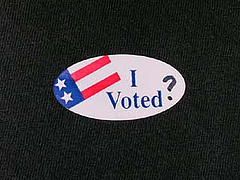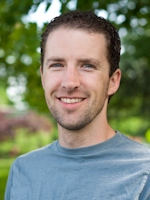
By Brian R. Gumm
As a Brethren sojourning with Mennonites at EMU in Harrisonburg, Virginia for the last four years, I’ve made many wonderful connections and friendships. As I went through my theological peacebuilding education, these friendships have often been fostered through deep conversations about any number of pressing theological, philosophical, and social issues. And for the past month or two, the persistent topic of conversation has been voting in national elections. One of my main conversation partners has been Ted Grimsrud, theology professor in EMU’s undergraduate Bible & Religion department. Ted has a series of three posts related to this, which I engaged through the comments section and as well as face-to-face conversations at a local pub. In an on-campus event recently I had the opportunity to condense some of my thoughts about a radical Christian stance toward voting in national elections, and I’m happy to share them here for Brethren consideration.
In a 1977 article in Sojourner’s, John Howard Yoder had this to say about the then-current context: “American political culture, a comparatively solid crust of common language and rules of thumb, floats on a moving magma of unresolved debate between two contradictory views of what the state is about.” In this article, entitled “The National Ritual: Biblical realism and the elections,” Yoder goes on to argue that we shouldn’t get ourselves too worked up about this system, or take it too seriously. But nonetheless this weak system is one that we can and perhaps should participate in. He claims that:
[Voting] is one way, one of the weaker and vaguer ways, to speak truth to power. We may do well to support this channel with our low-key participation, since a regime where it functions is a lesser evil…than one where it does not, but our discharge of this civil duty will be more morally serious if we take it less seriously.
This position of Yoder’s I take to be the basic position taken by Ted in his arguments. And while I’m sympathetic to both, I want to sound a few cautions. I’ll preface these cautions with a quote by Yoder’s one-time colleague at Notre Dame, Alasdair MacIntyre, who made these comments in the run-up to the 2004 presidential election:
When offered a choice between two politically intolerable alternatives, it is important to choose neither. And when that choice is presented in rival arguments and debates that exclude from public consideration any other set of possibilities, it becomes a duty to withdraw from those arguments and debates, so as to resist the imposition of this false choice by those who have arrogated to themselves the power of framing the alternatives.
Power and discourse – that is where I want to sound my cautions. Indeed, it is Alasdair MacIntyre who – along with Stanley Hauerwas and Ludwig Wittgenstein – have helped me begin to see the complexly interwoven nature of language and embodied practices within particular traditions, and how these become hardened, institutionalized, and sedimented into a social imaginary that becomes the very air we breath as we speak and act in our particular contexts. The framers of American political discourse and action, then, wield considerable power in shaping this imaginative world we inhabit.
Conversations about voting are often too simple: Yes or no to voting? If yes, then for whom? If no, why not? But voting cannot be spoken of in isolation from the system in which it is embedded. This week, if we’re talking about voting, we’re of course specifically talking about voting in the national presidential election. And we can’t speak of the national presidential election next week without speaking of the campaign process for that office. And we can’t speak of that campaign process without speaking of the popular media. And we can’t speak of the popular media without speaking about massive corporations and Super PACs. And we can’t speak of corporations and Super PACs without speaking about consumer capitalism and neo-liberal economics, which now rules the roost in this country and, increasingly, the world. All of these are of a piece, they all work together and coalesce to form what political scientist Benedict Anderson calls our “imagined community,” which at this place and time is the United States of America, itself an instance of that recent innovation, the modern nation-state.
Each one of these “hops” up the chain – representative-democratic elections as coercion, campaigning as propagandizing, mass media in the digital age, corporate power as oligarchy, consumerism as structured economic individualism, neo-liberal economics as nihilistic oppression – each of these should be seen as deeply problematic from a radical Christian perspective.
So while I concede that it’s possible to not get our hopes up too high and thus be able to walk into and out of the voting booth with a sober biblical realism, I want to say “Not so fast.” I want Christians to think long and hard about just how far down that rabbit hole goes. And as I look around at American society in general, and the Church of the Brethren in particular, I’m not convinced that we’ve done this kind of analysis and self-reflection. We’ve spent too much time watching or reading capitalistic-ideological “news” media and chattering on Facebook with people who already agree with us. Our imaginative capacities are not adequately constituted for such sober biblical realism that Yoder thinks right and good, and sometimes necessary.
Stanley Hauerwas has recently likened this age of American life to the Roman circus. The powers have devised a game to keep us distracted and stupid while successfully giving us the impression that in participating in national presidential elections, we are somehow exercising a sacred civic duty. But the radical Christian sees this differently. Yoder hints at this in the same article: “We shall expect more (relative) effect, witness and power-for-change, from the non-electoral modes of presence than from the franchise” (emphasis mine).
So the tactical, radical Christian response at this particular moment of American life may entail abstinence from the process, not only of voting but of being subjected to and participating in the never-ending media circus that consumes our lives, captivates our imaginations, and compromises our witness to the radical call of discipleship in the body of a Lord who washed feet, loved enemies, and carried a cross to his death, commanding those who had ears to hear – to go and do likewise.
A prayer, then: May we no longer be conformed to the pattern of this world, but be transformed by the renewing of our minds (Rom. 12:2) – and let that mind be in us, that was in Christ Jesus (Phil. 2:5). Amen.
 [Brian R. Gumm – M.Div, MA – is a licensed minister in the Northern Plains District of the Church of the Brethren. After four years in Virginia, he is preparing to return to his home state of Iowa, to the farm town of Toledo, to explore missional church and community peacebuilding opportunities. As a bi-vocational minister, Brian is also the Distance Learning Technology Analyst for Eastern Mennonite University. This post originally appeared on his Restorative Theology blog.]
[Brian R. Gumm – M.Div, MA – is a licensed minister in the Northern Plains District of the Church of the Brethren. After four years in Virginia, he is preparing to return to his home state of Iowa, to the farm town of Toledo, to explore missional church and community peacebuilding opportunities. As a bi-vocational minister, Brian is also the Distance Learning Technology Analyst for Eastern Mennonite University. This post originally appeared on his Restorative Theology blog.]

